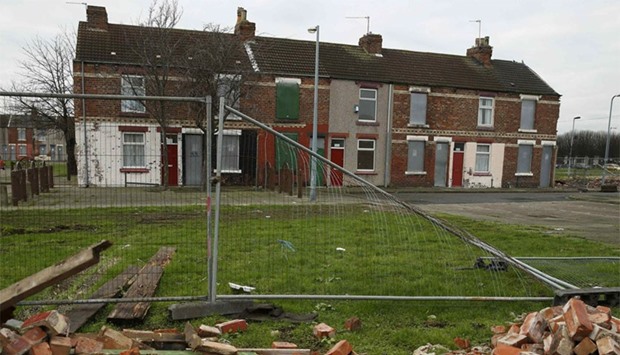Asylum seekers in a northern English town believe they are easy targets for racist abuse because they have been housed in properties that almost all have red front doors, a local support group manager said on Wednesday.
The houses in Middlesbrough are owned by a subcontractor of G4S, the outsourcing giant which has been embroiled in a series of scandals over alleged incompetence and abuses.
After a report about the red doors appeared on the front page of Wednesday's Times newspaper, a spokesman for G4S said its subcontractor, Jomast, would repaint the doors. Jomast said it was "ludicrous" to suggest it had practised discrimination.
Asylum seekers described having eggs and stones thrown at their windows, dog excrement smeared on their doors and racist jibes shouted at them, the Times reported.
Britain has not received migrants in the same huge numbers that arrived in other European countries last year, but public concerns over immigration are running high and tensions have risen in some communities with large numbers of migrants.
"Many of our asylum seekers feel the red doors make them a target," said Pete Widlinski, manager of local group Justice First, which offers support to claimants.
He told Reuters that he and others had raised the issue with G4S and Jomast several times, but the asylum seekers' concerns had been ignored until now.
Immigration Minister James Brokenshire said he had ordered an urgent audit of housing for asylum seekers in northeast England, which is provided by G4S under a government contract.
"Anything which identifies asylum seeker accommodation to those who may wish to harm those accommodated in the properties must be avoided," he told parliament, urging anyone who had suffered racist abuse to contact the police.
The Times quoted Ahmad Zubair, from Afghanistan, as saying he had repainted his front door white to stop the abuse, but a Jomast worker had repainted it red citing company policy.
"Asylum houses have red doors. Everyone knows that," Zubair was quoted as saying. "People were shouting outside the house, calling us hate words, throwing things at our windows."
The Times said it had identified 168 houses owned by Jomast of which 155 had red doors. Reporters spoke to people living at 66 of the properties with red doors and found that 62 of them housed asylum seekers of 22 nationalities.
String of scandals
Stuart Monk, owner and managing director of Jomast, said paint was bought in bulk for use at all its properties as was common practice among landlords.
"It is ludicrous to suggest that this constitutes any form of discrimination, and offensive to make comparisons to a policy of apartheid in Nazi Germany," he said in a statement, referring to headlines and comments in the Times report.
Jomast is highly profitable and Monk's fortune was estimated at 175 million pounds ($248 million) by the Sunday Times last year in its list of the richest people in Britain.
The G4S spokesman said Jomast accepted that the majority of houses where asylum seekers lived had red doors, and had agreed to repaint them so that there would be no dominant colour.
The Times said Middlesbrough had one asylum seeker for every 173 residents, the highest concentration anywhere in Britain.
The Home Office, or interior ministry, said its guideline was that no area should have more than one asylum seeker for every 200 residents and it was "working closely with G4S to implement a reduction programme" in Middlesbrough.
Asked about the allegations of racist abuse targeting asylum seekers, Widlinski said "there is an element of that" but added that on the whole Middlesbrough was a cohesive community where racism was less of a problem than elsewhere in England.
He said a far-right group had organised a rally in the town on Saturday to call for refugees not to be let into the country, and only 30 people had turned up, some of them from other towns.
The controversy over the red doors is the latest in a string of public relations disasters for G4S, one of the largest private employers in the world with around 611,000 employees.
The group, which has annual revenues of 6.8 billion pounds, failed to provide enough security guards for the London 2012 Olympics and the army had to fill the gap. In 2013, it admitted overcharging on a British government contract to tag criminals by billing for some who were dead or not tagged.
G4S also got into trouble over its handling of a deadly riot at an immigration detention centre in Australia in 2014, while earlier this month it fired four workers over alleged use of unnecessary force against British young offenders.

